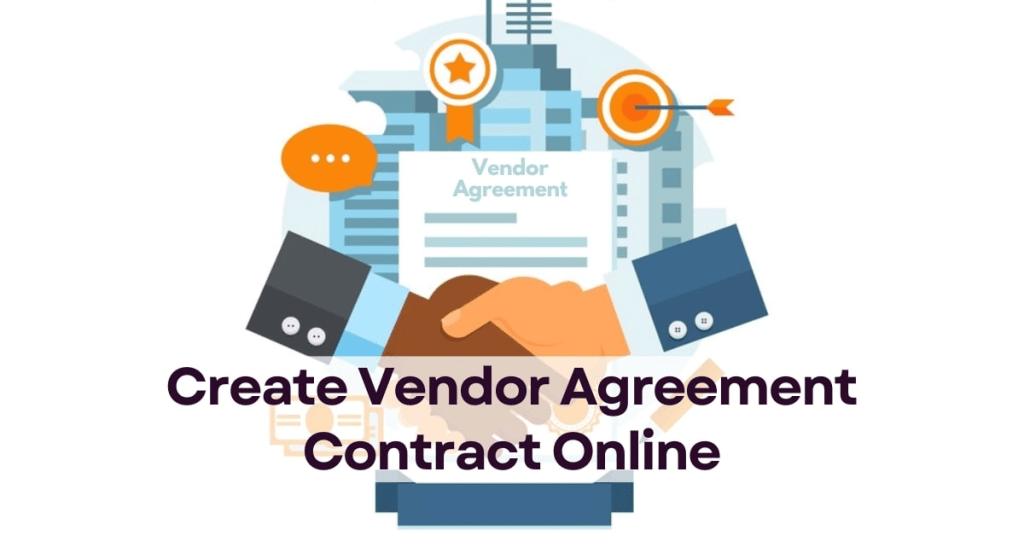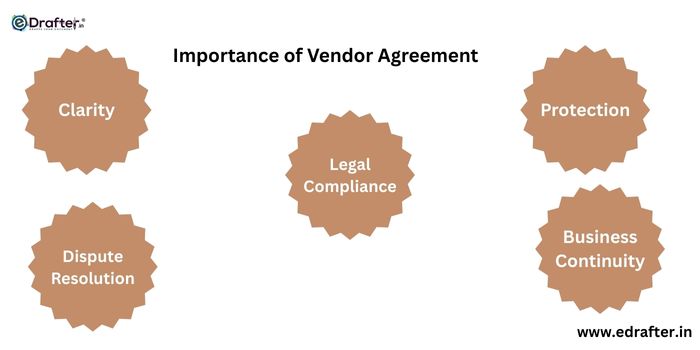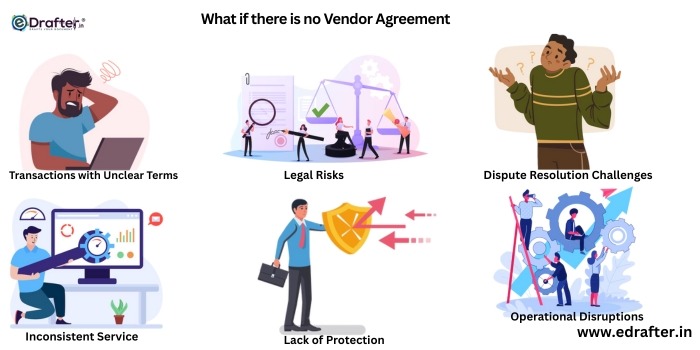
Table Of Content
- What is a Vendor Agreement?
- Who needs a Vendor Agreement?
- Why is it important to have a Vendor Agreement?
- What should be the Vendor Agreement Format?
- How to create a Vendor Agreement online?
- What are the Key benefits of creating a Vendor Agreement?
- What are the common mistakes to avoid in a Vendor Agreement?
- Do I need any Documents for a Vendor Agreement Contract?
- What if there is no Vendor Agreement?
- What are the important clauses for Vendor Agreement?
- Conclusion
A Vendor Agreement is a Legally binding contract between a seller (Vendor) and a buyer (usually an organization or individual), defining terms for the sale or provision of goods/services. It covers pricing, payment schedules, delivery terms, warranties, liabilities, and dispute resolution mechanisms. This Agreement ensures clarity and protects both parties by outlining their responsibilities, complying with Legal requirements, and fostering a structured approach to business relationships. It is essential for managing expectations and mitigating risks associated with transactions, ensuring smooth operations and adherence to agreed-upon terms. Let’s dive deep into this blog to know how you can create a Vendor Agreement online.
What is a Vendor Agreement?
A Vendor Agreement is a contract that binds the seller, supplier or service provider (Vendor) to the buyer (usually an organization or individual). The Document establishes terms and conditions for the purchase or provision of goods or services. The important parts are pricing, payment schedules, delivery dates, warranties, liabilities and ways of solving disputes. This is because it enables them to understand their responsibilities towards each other in order to avoid any misunderstandings and conflicts. It helps protect both suppliers and consumers by outlining how they should conduct business together in line with Legal requirements as well as commercial expectations.
Who needs a Vendor Agreement?
it is essential for any corporation or individuals to have a Vendor Agreement when purchasing commodities or availing services from Vendors. All organisations in different sectors including both small and large entities will be covered by this Agreement which clearly defines the terms under which products are sold/commercialised/monetized.
Why is it important to have a Vendor Contract Agreement?
To have a Vendor Agreement is Important because:

- Clarity: Clear transaction terms that minimize confusions.
- Protection: Rights and obligations of both parties are safeguarded.
- Legal Compliance: Ensures adherence to Legal requirements.
- Dispute Resolution: Provides a framework for resolving conflicts.
- Business Continuity: Establishes expectations for consistent supply or service delivery.
What should be the Vendor Agreement Format?
Typically, the Vendor Agreement format should include:
- Introduction: Identifying the parties involved and purpose of this Agreement.
- Scope of Services or Goods: This will clearly indicate what products or services are being provided.
- Terms and Conditions: Payments which have been detailed, time schedules for deliveries including warranties as well as any special conditions that may apply.
- Responsibilities: The duties or roles that both parties need to play are outlined in this section
- Intellectual Property Rights: Ownership and use of intellectual property linked to the goods/services
- Confidentiality: Stipulates how confidential information is supposed to be handled.
How to create a Vendor Agreement online?
To create a Vendor Agreement online, you can visit our website edrafter.in and follow some easy steps to create this agreement. Here are the steps:
- Click on the ‘Legal Documents’ and then ‘Request for Customized Document’ in the main menu of our website.
- Now, you will be redirected to our ‘Custom Document Drafting’ page where you need to fill a simple form to provide us some required information.
- Now, we will schedule a call for you with our Advocate and we will share the call details on your email.
- During the call, Advocate will understand your requirement for the Document.
- Now, our Advocate will prepare a draft of your document and the same will be shared with you on your email for your approval.
- Now, you can check the draft and ask for any changes if you want.
- Now, Advocate will make the changes you asked and will share the same again for your approval.
- Once you approve the draft, our team will create the document and will send the hard copy of your document at your doorstep.
What are the Key benefits of creating a Vendor Agreement?
A vendor agreement, if well drafted provides numerous benefits. Some of the key benefits are:
- Clear communication: It prevents misunderstanding and defines what the roles and responsibilities of both parties.
- Risk Mitigation: A Vendor Agreement reduce the issues that may arise in the future before.
- Payment terms: It mentions the payment terms and conditions that reduces the chance of delayed payments and payment related disputes.
- Quality Assurance: It sets standards for the quality and guarantee the consumer is receiving value-for-money products or services.
What are the common mistakes to avoid in a Vendor Agreement?
There are various common mistakes that one should avoid while making a Vendor Agreement. Some of the common mistakes to avoid are:
- Unclear Terms: Having unclear language can lead misunderstandings between both parties. Therefore, it is highly recommended to have clear language and terms in the Agreement.
- Missing Deadlines: Not specifying deadlines for when a product should be delivered, or a service must be completed can result in work taking longer.
- Ignoring legal requirements: Not following the local and industry-specific laws can lead both parties into disputes.
- No Dispute Resolution Claus: If you don’t define the way to resolve the dispute in the Agreement then both parties can get stuck in the court for a long time.
Do I need any Documents for a Vendor Agreement Contract?
Yes, you typically need certain Documents to draft and finalize a Vendor Agreement contract:
- Business Information: Details about your business and the Vendor’s business.
- Terms and Conditions: A clear outline of the terms agreed upon, which include pricing, delivery and payment terms.
- Product or Service Specifications: A description of the goods or services being provided.
- Legal Review: Ensuring compliance with applicable laws and regulations.
- Authorization: Confirmation that those who sign have power to enter into contract on behalf of their respective organizations.
- Supporting Agreements: Other contracts mentioned or needed for this transaction (SLAs, warranties etc.)
What if there is no Vendor Agreement?
In the absence of a Vendor Agreement:

- Transactions with Unclear Terms: Transactions can be uncertain on pricing, delivery and other material terms resulting in misunderstandings.
- Legal Risks: Both parties are exposed to disputes or Legal responsibilities as there is no term defined for them.
- Dispute Resolution Challenges: Without a pre-defined mechanism, resolving conflicts becomes difficult.
- Inconsistent Service: Expectations for quality, delivery schedules and other services may not be consistently be met
- Lack of Protection: Both parties may lack Legal safeguards in case of non-performance, breaches or other issues.
- Operational Disruptions: The reliability of supply or service Agreements may lead to business disruptions.
What are the important clauses for Vendor Contract?
Important clauses for a Vendor Agreement include:
- Scope of Work: Clearly defining what is being given in terms of products/services.
- Payment Terms: Includes pricing, invoicing procedures, and payment schedules.
- Delivery Terms: These include delivery schedules, shipping responsibilities and acceptance criteria.
- Warranties and Guarantees: Ensuring quality standards are set as well as remedies for non-compliance.
- Intellectual Property Rights: Dealing with ownership and utilization of intellectual property.
- Confidentiality: Safeguarding sensitive information shared during a business relationship.
- Indemnification: Clearing up damages or losses responsibility and liabilities
- Termination: Conditions where either party can terminate the Agreement
Conclusion
In conclusion, Vendors Agreement defines critical aspects such as pricing, payment terms, delivery schedules, and dispute resolution mechanisms, ensuring clarity and Legal compliance. Without this Agreement, both parties face risks of misunderstandings, Legal disputes, and operational disruptions. By establishing clear expectations and safeguards, the Vendor Agreement promotes smoother transactions and enhances trust between parties.

